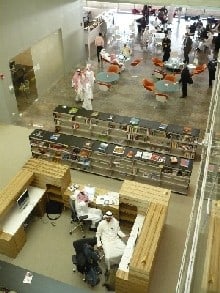
By Matin Durrani
If you’ve read my news story and blog entry earlier today, you will have realized that I am spending a couple of days at the King Abdullah University of Science and Technology (KAUST) in Saudi Arabia.
The question on my lips is can the university fulfil its ambitions and become a world-leading institution, carrying out research into solar power, nanotechnology, clean water and everything else the country has its eyes on. Can it simply “buy success” by building a new university, pouring in oodles of cash, paying for lots of top-notch equipment and recruiting what are reported to be some of the world’s top scientists in their fields. (Or so I am told — I haven’t actually met any yet).
It’s a bit like Russian billionaire Roman Abramovich buying Chelsea football club and snapping up the world’s best players, the only difference being he already had a football club with a 100-year tradition to buy.
I caught up with Choon Fong Shih, KAUST’s president, shortly before the king himself was due to attend the official launch party in a vast “tent” filled with the great and the good from Saudi Arabia and beyond.
As far as Shih is concerned, failure is not an option. Speaking to me near the front of the vast indoor arena, he brushed aside suggestions that KAUST might not work. “We are free of legacies and traditional boxes”, he said, referring to the fact that the university is starting from scratch and with interdisciplinary being the key.
CERN boss Rolf-Dieter Heuer, who is on KAUST’s board of trustees, was a bit more cautious, talking to me about the “challenges” of encouraging researchers to stay beyond just a few years and of making sure that the university has good links with the rest of the country.
“But it’s a new way of doing things and this is what I like,” says Heuer.
KAUST may do good work, but can it meet the standards set by, say, Bologna, Cambridge or Oxford universities, which have taken centuries to reach the top?
This is probably a cop-out, but only time will tell. Still, it makes an interesting experiment – and if KAUST works, it may encourage other emerging nations to do likewise, which is surely a good thing.



